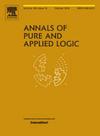Extreme types and extremal models
IF 0.6
2区 数学
Q2 LOGIC
引用次数: 0
Abstract
In the affine fragment of continuous logic, type spaces are compact convex sets. I study some model theoretic properties of extreme types. It is proved that every complete theory T has an extremal model, i.e. a model which realizes only extreme types. Extremal models form an elementary class in the full continuous logic sense if and only if the set of extreme n-types is closed in for each n. Also, some applications are given in the special cases where the theory has a compact or first order model.
极端类型和极端模型
在连续逻辑的仿射片段中,类型空间是紧凑的凸集。我研究了极端类型的一些模型论性质。研究证明,每个完整理论都有一个极值模型,即一个只实现极值类型的模型。当且仅当极端类型的集合闭合于每一个......时,极端模型才构成完全连续逻辑意义上的一个基本类。此外,我们还给出了在理论具有紧凑模型或一阶模型的特殊情况下的一些应用。
本文章由计算机程序翻译,如有差异,请以英文原文为准。
求助全文
约1分钟内获得全文
求助全文
来源期刊
CiteScore
1.40
自引率
12.50%
发文量
78
审稿时长
200 days
期刊介绍:
The journal Annals of Pure and Applied Logic publishes high quality papers in all areas of mathematical logic as well as applications of logic in mathematics, in theoretical computer science and in other related disciplines. All submissions to the journal should be mathematically correct, well written (preferably in English)and contain relevant new results that are of significant interest to a substantial number of logicians. The journal also considers submissions that are somewhat too long to be published by other journals while being too short to form a separate memoir provided that they are of particular outstanding quality and broad interest. In addition, Annals of Pure and Applied Logic occasionally publishes special issues of selected papers from well-chosen conferences in pure and applied logic.

 求助内容:
求助内容: 应助结果提醒方式:
应助结果提醒方式:


